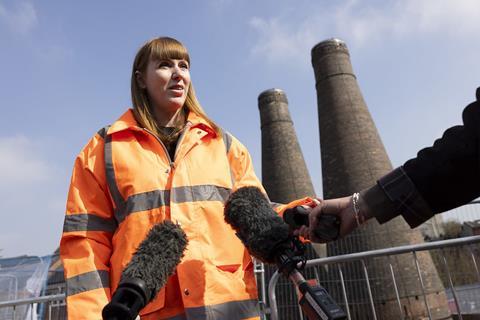Bill heads to committee as experts hit out at reforms to nature protections
The government has said amendments to the planning bill will halve the average two-year statutory pre-consultation period on major housing projects and could save £1bn during this parliament.

Announcing changes to the Planning and Infrastructure Bill this week, the Ministry of Housing, Communities and Local Government said: “Burdensome statutory consultation requirements unique to major infrastructure projects will be scrapped.
It added: “Developers currently spend significant time and money on long, technical documents resulting in communities feeling fatigued and confused, which is a direct result of overly complex planning rules that are leaving working people deprived of the things their areas need to thrive. It also disincentivises developers making improvements to projects for fear of having to re-consult.”
Deputy prime minister Angela Rayner said the amendments would “strengthen” the bill and added: “We can’t afford to have projects held up by tiresome requirements and uncertainty.”
The amendment would also apply to the pre-consultation process for infrastructure schemes, which the government said would pave the way for increased delivery of new roads, railways and windfarms.
Other key measuers in the bill include the introduction of a national scheme of delegation, bolstered compulsory purchase powers and a new Nature Restoration Fund.
A parliamentary committee set up to scrutinise the legislation heard evidence on the bill for the first time today (Thursday), after it passed its first and second readings in the Commons in March.
On the morning of the hearing, MPs received a letter from more than 40 climate experts and former advisers warning that the legislation’s nature protections were not strong enough and constituted a “license to kill” protected species.
The group allege that the levy set out in part three of the bill is effectively a “pay to pollute” mechanism, through which developers can pay Natural England in exchange for damaging protected sites and species.
The legislation would establish a Nature Restoration Fund, which developers could choose to pay into rather than setting out mitigation measures themselves.
This fund would then be spent to support Natural England to bring forward environmental delivery plans to ensure natural protections.
The letter also disputed whether the levy would lead to a more efficient system, noting that previous levy schemes to fund infrastructure had often led to lengthy viability negotiations between developers and planning authorities.
One of the signatories, former Natural England deputy chairman David Hill, said: “I cannot believe we have come to this position. Under the watch of previous governments, the debate had always been around how far we should progress to increase protection and funding for nature and green growth.
“Now, regressive laws are being quietly accelerated through Parliament with no public consultation, impact assessments or pilots.
“Part III of the Planning and Infrastructure Bill harms our economy, rather than helps it, and will deliver a profoundly unacceptable blow to our natural environment, which, unlike the economy, may never recover.”
>> Read more: Planning and Infrastructure Bill sets out radical shake-up of committee system
Under the existing system, developers are expected to demonstrate how they plan to mitigate the ecological impacts of their proposed schemes, for instance nutrient pollution.
The housebuilding industry has argued that these mitigation requirements are too burdensome and are holding up housing delivery across the country.
In 2023, the HBF claimed that 150,000 new homes were being blocked due to nutrient regulations, but that new homes accounted for a small proportion of nutrient pollution.
In guidance setting out its plans for part three, the government said its new system took a more “holistic view” of mitigation, rather than taking a site specific approach.
“Our landmark Planning and Infrastructure Bill will fundamentally change how we build things in this country,” said housing minister Matthew Pennycook.
“By streamlining the delivery of new homes and critical infrastructure, it will help tackle the housing crisis and raise living standards in every part of the country.








1 Readers' comment